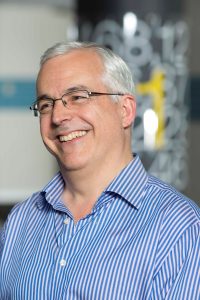When and why did you join IPEd?

Colin Jevons
I joined the Society of Editors, later known as the Society of Editors (Victoria), as an organisation that supported editors to become more professional. I joined in the depths of a recession, after I’d graduated with a science degree, because I’d got a job as a publisher’s sales rep.
This was fun for a little while, but ultimately not very satisfying, but my boss thought I’d make a good editor. So I left behind the bright orange Holden company car to find out what was involved with being a good editor.
Back in 1980 there weren’t any formal training courses so I joined the society to meet real editors and learn from them. Then, as now, editors were lovely, kind and generous people and I learned a great deal very quickly and made some lifelong friends.
One of those friends was Teresa Pitt HLM, who had done a subject called ‘editing and publishing’ in a Graduate Diploma in Secretarial Studies at the then Caulfield Institute of Technology. I wonder what the gender mix of students in that course was, but I never investigated. It was better to employ expert freelance editors and learn from what they did.
What is your current and past involvement with IPEd?
The people in the Society of Editors who provided my training and induction into the profession were much better editors than me, but I was quite good at organising stuff. So when Teresa shook up the society by asking if it was just a social club that met for dinner and too much to drink once a month, or if it was to do more serious work like training and accreditation standards, I happily joined in.
I served on the committee for years, including a term as President, and marvelled at the talents of people like Teresa and the wonderful writer and newsletter editor John Bangsund, who so sadly died of COVID last year.
Why did IPEd honour you with honorary life membership?
I say jokingly that I was awarded honorary life membership once I was safely out of the industry, but it was for administrative services and helping with leadership. I chaired the course development and course advisory committees for the first course specifically designed for editors, which ended up becoming the Centre for Publishing Studies at RMIT.
What does IPEd mean to you?
It’s a constant reminder to me that you can have fun and be professional at the same time. I admire the way it has gone from strength to strength and fondly remember the amateur beginnings.
What is your current job?
It’s quite different to being an editor, on the face of it. I moved into business academia, did a PhD in marketing, and am now Director of the Bachelor of Business degree at Monash University, Caulfield campus (yes, the location where Teresa did her secretarial studies diploma).
What does your role entail?
It involves teaching and researching in business but also uses some editing skills. For example, I frequently ask what it is we are doing, how we are doing it and why anyone would be interested, skills I learned as a structural editor. And in a time of enormous disruption caused by the pandemic, these questions are more important than ever.
I suspect I’m the only former committee member to have become a business academic, but I think this shows how the skills you develop as an editor can be applied to different professions and industries.
